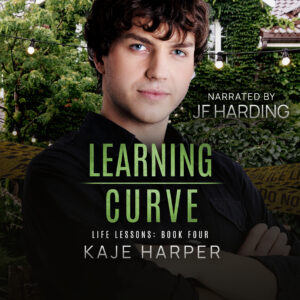Narrated by J.F. Harding
Note: There are spoilers for the previous books in the series in this review.
It’s always sad when it comes time to say goodbye to characters you’ve come to know and love over the course of a series, and now it’s time to wave Mac and Tony off into the sunset as Kaje Harper’s excellent Life Lessons series reaches it conclusion with Learning Curve. Like the other books in the series, the author melds together an interesting procedural/ investigation plotline with the continuing development of the relationship between her two leads, although given the way we left them at the end of Home Work, the focus here is more on the domestic as Mac is still not quite ready to go back to work after his injury and Tony is struggling to come to terms with the fact that Mac is absolutely determined to go back to the job he so loves, but which almost took him away from Tony and their kids.
It’s been three months or so since Mac was shot and left with a condition called Broca’s Aphasia, which affects the speech and language regions of the brain. He’s been working really hard on getting into shape physically, and his comprehension has not been affected – but his ability to find the right words at the right time is not yet sufficiently recovered for him to be able to return to duty, and the loss of the ability to inflect his speech with any degree of expressiveness (so he can sound somewhat robotic) has affected his ability to interact as positively with witnesses as he used to. When Learning Curve begins, he’s having another assessment to see if he’s fit to return to work – and although reluctantly, he has to agree with the doctor’s assessment that he’s not quite there yet.
Tony, meantime, is torn between being happy at having his husband safe and home with their family (and helping out with everything that goes along with running a home and parenting two young kids), and wishing Mac might never be able to return to being a detective, even though he castigates himself for being so selfish. He knows how important Mac’s job is to him, and how, for so many years, it’s defined him, but the thought of Mac being back out there again terrifies him and he’s having to work hard to keep those fears from spilling over into his begging Mac not to go back.
Then Mac gets a call from his partner, Oliver, asking him if he’ll come into the station to talk to an eighteen-year-old witness who is refusing to engage with anyone, but who had an old slip of paper in his wallet with Mac’s name and phone number on it. Mac isn’t sure how much help he can be, but he agrees to try. He decides not to tell Tony right away – maybe the kid will blank him as well and he won’t need to say anything.
When Mac arrives and introduces himself, Carey Mulloy tells him that he used to be one of Tony’s students, and Mac realises he must have written down his name and number back when Tony gave them out during the murder investigation that brought them together (Life Lessons). Carey was brought in after he was found sitting by the dead body of his dad’s boyfriend Wade in the living room of the house his dad shared with his younger son, Quinn. Carey is shaken up and scared, but the one thing he’s sure of is that his dad – who has disappeared – didn’t kill Wade, and he wants Mac to find him and prove it. As Mac hasn’t been cleared to return to work yet, he agrees to work on the case as a consultant – and Oliver jumps at the chance. He’ll take whatever help Mac is able to give him on this one.
Mac is almost overwhelmed by the relief and joy he feels at being able to be useful again in that part of his life that has been essential to him for so many years – but there’s guilt there, too; although he knows Tony is rooting for him to get better, he also knows that his return to work isn’t something his husband is looking forward to.
The investigation in this book is once again complex and interesting, but the domestic and personal angles to the story are predominant here, with Mac finally coming to accept that there are some things about himself he’ll never get back, and beginning to learn new ways of working and making the most of everything he is still able to do and be. The tension between him and Tony over this is palpable but never overdone, and feels very realistic; Tony loves Mac too much to force him to make a choice between him and their family and his job, but it’s clear how often he has to bite his tongue when the subject arises. There are other tensions, too – Tony is preparing to formally adopt his foster-son, Ben (despite the objections of the boy’s bigoted grandparents) and Mac receives news that his mother is dying, which brings him back into contact with his estranged family. (Once we meet them, it’s more than easy to understand the reasons for that estrangement.) All of these threads are skilfully woven together to produce a gripping story that tugs at the heartstrings while being exceptionally well grounded, setting life’s little victories against its disappointments, its fears against its hope and all the other things in between.
The one thing that bothered me just a little bit – and I suspect this is a ‘me’ thing rather than a ‘book’ thing – is that while I was cheering Mac on in his endeavours to get back to the job he loves, Mac getting everything he wants means that Tony doesn’t quite get what he wants, if that makes sense? Apart from fearing for his husband’s safety, Tony knows Mac going back to work is going to also mean going back to missed meals, missed weekends out with the kids, missed school pick-ups… I just hope Mac has learned enough about what goes into making a home and being a parent over the past year or so that he’s able to find a better work/life balance going forward!
J.F. Harding’s work on this series has been absolutely outstanding from start to finish. His characterisation of the two leads is simply perfect; Mac’s deep, gruff tones hiding all that inner vulnerability and deep emotion, and contrasting nicely with Tony’s brighter, more upbeat delivery that always says ‘this is who I am, like it or shove it!’ Mr. Harding enhances the strong connection the author has created between them, bringing a tenderness and affection to their interactions that ring very true, and has done an amazing job of rendering Mac’s speech – which has altered due to his TBI – taking into account his flattened inflection and his hesitance, and expertly conveying how frustrated he can become as a result. There’s quite a large secondary cast here, some characters we’ve met before, like Oliver and Ben’s grandparents, and others we haven’t, but all of them are portrayed distinctly, appropriately and – in the case of the recurring characters – consistently across all four books. I have to – again – make special mention of the way Ben and Anna are voiced; not only are they written in such a way as to be completely believable six/seven-year-olds, Mr. Harding manages to make them sound that way, too.
Learning Curve is a terrific series finale to this unmissable series, tying up all the loose ends while at the same time, Mac and Tony are working out what the future looks like for their small family. I applaud Kaje Harper for her wonderful stories, and J.F. Harding for bringing Tony and Mac to life in such a vibrant, genuine and emotionally resonant way. I’ve already re-listened to some of the books in the series, and I’m sure Life Lessons is going to have a regular place in my list of regular comfort listens.
Caz
Buy Learning Curve by Kaje Harper on Amazon





this series is definitely one I will relisten to. I agree with your excellent review in every way, only I might use even more superlatives for how well J.F. Harding does Mac’s voice after the TBI. It’s masterful. He keeps the Mac’s voice recognizable from the previous books while changing how it’s delivered. That had to be tricky. This is why I love audiobooks, to hear these vocal artists bring a character to life.
As for your niggle over the compromise, that made me a little sad, too, because I did feel Tony (and the kids) compromised more than Mac. But I also think that’s how it works. In real life one partner often has to give up more, at least temporarily. I guess we hope that over a lifetime together, the compromises even out.
Thank you :)
And yes, I’d like to think that Mac has learned enough about family life by now to know when he can and when he really shouldn’t cancel plans with Tony and the kids.